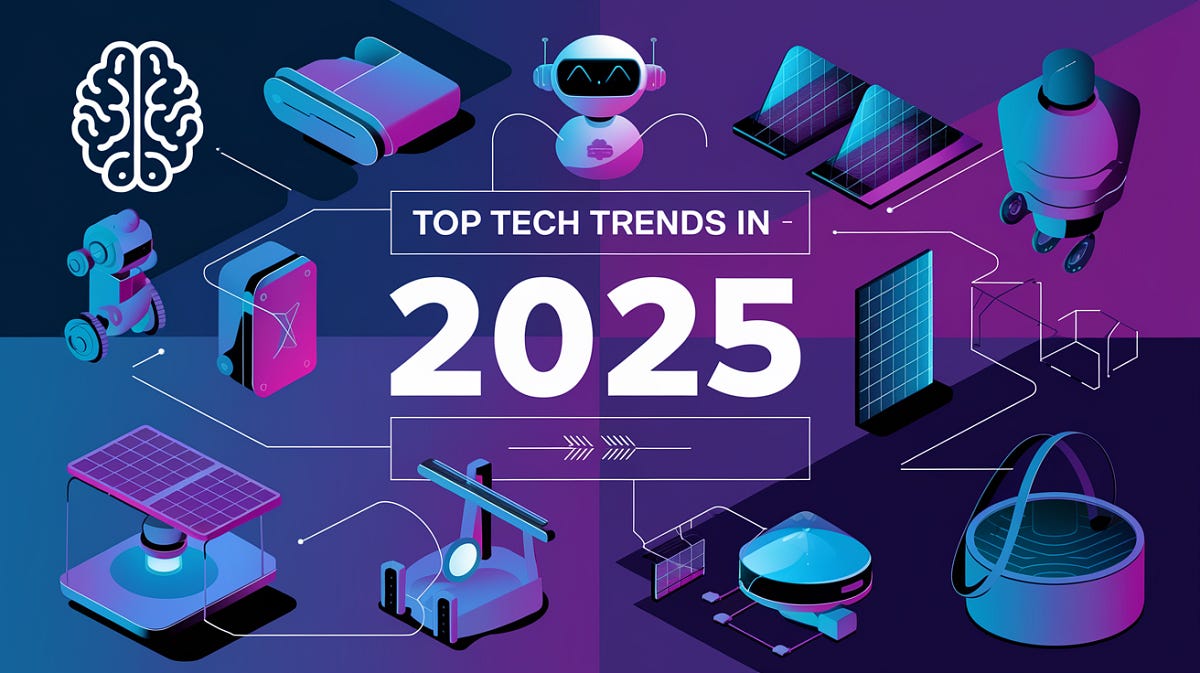Introduction
Artificial Intelligence is evolving faster than ever, and 2025 promises groundbreaking trends that can’t be ignored. From creative automation to healthcare innovations, AI is no longer a futuristic concept—it’s actively reshaping industries, business processes, and everyday life. Staying informed about AI trends 2025 is essential for tech enthusiasts, business leaders, and consumers who want to leverage AI effectively.
In the coming years, AI will redefine how we work, communicate, and interact with technology. Businesses will harness smarter analytics and automation tools, healthcare providers will deliver personalized care faster than ever, and consumers will experience AI-powered products in ways that feel almost magical.
This article explores the future of AI in 2025, highlighting top innovations, emerging trends, and practical applications across industries and daily life. You’ll discover developments in generative AI, AI-driven healthcare and business solutions, ethical AI, consumer technology, and cutting-edge innovations shaping the next wave of AI adoption. Understanding these trends will help you stay ahead, adapt strategies, and maximize the potential of AI in the year ahead.
Generative AI and Creative Automation
AI-Generated Content
Generative AI is one of the most exciting trends of 2025. It can produce text, images, music, and videos rapidly, helping creators and marketers scale output while maintaining quality. From blog posts to digital art, AI content generation is saving time and enabling innovation at an unprecedented pace.
Applications in Marketing and Design
AI streamlines creative workflows across industries. Marketers generate ad copy, social media posts, and email campaigns automatically, while designers produce concept art or mockups with AI assistance. This automation reduces repetitive work and frees professionals to focus on strategy, storytelling, and innovation.
Tools to Watch
- Text Generators: AI writing assistants produce coherent, high-quality content for articles, scripts, and campaigns.
- Image & Video AI: Tools generate realistic visuals and animations from prompts.
- Music Composition AI: Platforms create original soundtracks for media and entertainment.
AI in Healthcare and Life Sciences
AI Diagnostics and Personalized Medicine
AI enhances healthcare by enabling faster diagnostics and personalized treatment. Machine learning models analyze patient data, detect conditions early, and recommend tailored therapies, improving outcomes and efficiency.
Drug Discovery
AI accelerates drug research by predicting molecular behavior, identifying promising compounds, and simulating trials. This reduces time-to-market for medications and opens doors for innovative treatments.
Remote Health Monitoring
AI-powered wearables track vital signs, detect anomalies, and send real-time alerts to providers. Continuous monitoring enables early interventions, improving the quality of care.
AI in Business and Automation
Intelligent Process Automation
AI-driven tools streamline workflows, reduce errors, and optimize productivity. Companies automate repetitive tasks like invoice processing, data entry, and reporting, allowing employees to focus on higher-value work.
AI in Customer Experience
Chatbots, AI assistants, and personalized recommendations enhance service. Businesses respond instantly to queries, tailor experiences to individual preferences, and analyze behavior for ongoing improvement.
Predictive Analytics
AI-powered analytics forecast demand, optimize inventory, and anticipate market trends. Data-driven insights enable proactive decision-making for competitive advantage.
Ethical AI and Governance
Responsible AI Development
Responsible AI ensures fairness, reduces bias, and maintains transparency, building trust in systems that affect people’s lives.
Regulations and Standards
Governments and organizations are establishing policies to safeguard society. Standards guide ethical use, ensure accountability, and regulate sensitive AI applications like facial recognition or predictive policing.
Data Privacy Considerations
Protecting personal information is paramount. AI systems must comply with privacy laws, encrypt data, and allow users control over their information.
AI in Daily Life and Consumer Technology
Smart Homes and IoT Integration
AI-powered smart homes manage lighting, temperature, security, and appliances. Systems learn user habits, automate routines, and improve energy efficiency.
AI Personal Assistants
Virtual assistants streamline daily tasks, schedule reminders, and optimize productivity, making technology more user-friendly.
Entertainment and Gaming
AI enhances immersive experiences in games, streaming, and media recommendations. Adaptive gameplay, personalized content, and AI-driven entertainment are transforming how people engage with digital media.
Emerging AI Technologies to Watch
Edge AI
Edge AI processes data on devices rather than in the cloud, reducing latency and improving responsiveness. Applications include autonomous vehicles and IoT devices, delivering real-time intelligence at the edge.
AI for Cybersecurity
AI strengthens digital security by detecting threats, preventing attacks, and responding automatically. Machine learning identifies patterns indicative of malware, phishing, or suspicious activity.
Human-AI Collaboration
AI increasingly augments human skills rather than replacing them. Collaborative tools enhance decision-making, creativity, and problem-solving, allowing humans to focus on strategic tasks.
Conclusion
The AI landscape in 2025 is dynamic and transformative. From generative AI and healthcare breakthroughs to business automation, ethical governance, and consumer applications, AI innovations are set to impact every aspect of life.
Staying informed about emerging AI trends allows businesses, tech enthusiasts, and consumers to adapt strategies, optimize productivity, and leverage AI safely. By embracing these technologies thoughtfully, individuals and organizations can stay ahead and maximize the benefits of the next generation of intelligent, adaptive AI.
